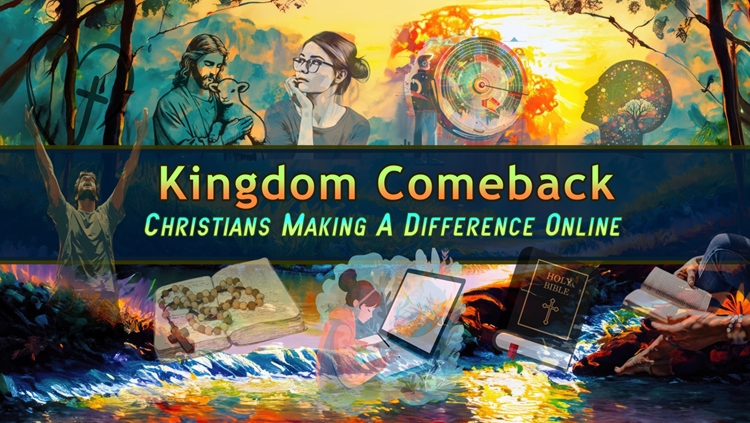In the digital age, online communities are integral to our social fabric. They offer spaces where people can connect, share, and find support, regardless of geographical boundaries. For Christians, these online platforms present an opportunity to live out their faith by positively impacting others through encouragement, support, and genuine engagement. Here are some effective ways Christians can help people inside online communities, creating meaningful connections and fostering spiritual growth.
1. Building an Atmosphere of Compassion and Respect 
The essence of Christian faith is love and compassion, as emphasized by Jesus’ command to “love your neighbor as yourself” (Matthew 22:39). This principle can extend to online interactions. In many online spaces, conversations can quickly become hostile or aggressive. By embodying Christ’s compassion, Christians can create a counter-culture of respect and kindness in these spaces. Simple acts such as avoiding inflammatory language, listening genuinely, and showing empathy toward others can go a long way in building a positive atmosphere.
An atmosphere of compassion and respect can encourage others to open up and share their struggles, thoughts, and questions, knowing they won’t be judged or criticized. This openness can lead to deeper, more meaningful conversations where Christians can offer genuine support, encouragement, and spiritual insights.
2. Being a Source of Encouragement and Hope
Many people turn to online communities to seek encouragement, understanding, and support. People often reveal personal struggles or challenges on social media, forums, or chat rooms. Christians can use these opportunities to offer words of hope and encouragement rooted in biblical truths. Sharing scriptures that speak to God’s promises and offering prayers can provide comfort and assurance.
For example, someone might post about feeling anxious or overwhelmed. A Christian response could be to share encouraging Bible verses about God’s peace and offer to pray for them. This brings hope to the person in need and demonstrates faith in action to others in the community who witness it.

3. Practical Support and Service
Sometimes, the best way to help is through practical means. Online communities often bring together people with specific needs or goals, such as finding job opportunities, navigating mental health challenges, or managing finances. Christians can contribute by offering practical advice, resources, or networking opportunities. Those with specific skills can use their knowledge to assist others by reviewing a resume, providing budgeting advice, or offering tips for managing stress and anxiety.
This type of service exemplifies the teachings of Jesus, who consistently met people’s physical and practical needs. Acts of service can be transformative, showing others that faith is spiritual, useful, and grounded in real-world help. 
4. Creating a Safe Space for Open Conversations about Faith
While not everyone in an online community will be open to discussing faith, many people are spiritually curious or struggling with faith-related questions. Creating an open and non-judgmental space allows Christians to invite conversations about God, religion, and purpose without being pushy or preachy.
This could mean starting a faith-based discussion group, a Bible study, or even a Q&A thread where people feel comfortable asking questions about Christianity. Christians should approach these conversations with humility, remembering to respect the diverse backgrounds and beliefs of others. This approach allows others to explore faith at their own pace and feel that their questions and doubts are valued rather than dismissed.
5. Offering Emotional and Spiritual Support
Many people online seek validation, understanding, and reassurance. Christians can support these emotional needs by being available for people who need someone to talk to. Offering a listening ear, responding with empathy, and sharing personal experiences can help others feel less alone.
Spiritual support might include praying for others, sharing devotional resources, or offering spiritual guidance. In times of crisis, such as a loss or a significant life change, Christians can come alongside others to provide comfort and encouragement. Christians can provide emotional and spiritual solace by pointing people to hope beyond their circumstances.
6. Using Technology for Discipleship and Mentorship
For those open to more profound spiritual growth, Christians can use online platforms to mentor and disciple others. This can be done through one-on-one messaging, group studies, or video calls. A mentorship relationship allows Christians to walk alongside others in their spiritual journey, offering guidance, accountability, and support. Digital discipleship can be particularly impactful for people who are isolated or lack a local church community.

Through regular communication and intentional guidance, Christians can help others grow in their faith, learn more about the Bible, and develop a closer relationship with God. Online discipleship and mentorship can serve as a lifeline for new believers or those who feel disconnected from traditional church settings.
7. Promoting Unity and Peace
In divisive online environments, Christians can stand out as peacemakers. In a world polarized by differing opinions and beliefs, it’s easy for online discussions to turn into arguments. However, Christians can follow Jesus’ example as a peacemaker by promoting unity and understanding rather than division. Instead of escalating conflicts, Christians can practice patience, avoid harsh words, and encourage constructive dialogue.
This doesn’t mean avoiding complex topics or compromising on values but rather addressing issues with grace and kindness. By focusing on unity and understanding, Christians can create a more welcoming and inclusive environment that reflects God’s love for all people.
8. Modeling Christlike Character in All Interactions
Christians are called to be ambassadors of Christ, reflecting His character in their words and actions. Online interactions should be no exception. Modeling humility, patience, kindness, and integrity in every conversation, comment, or post can have a powerful impact on those observing.

Practically, this might mean refraining from gossip, choosing not to engage in gossip, avoiding negative or sarcastic comments, and always treating others respectfully. When Christians model Christlike behavior, they demonstrate the transformative power of faith and draw others to seek more about the God they serve.
9. Engaging in Prayer for the Community and Its Members
Prayer is one of the most powerful tools Christians have to support others, even in online spaces. Praying for people’s needs, challenges, and struggles within an online community can have a spiritual and emotional impact. Christians can keep a prayer list for those they encounter or offer to pray for specific requests when appropriate.
Moreover, posting or inviting others to pray online can foster unity and collective reliance on God. While it might seem simple, prayer can be a deeply impactful way to uplift and intercede for others, even if it’s done virtually. 
10. Creating and Sharing Uplifting Content
One practical way Christians can support online communities is by creating and sharing positive, faith-centered content. This might include Bible verses, uplifting quotes, testimonies, or inspirational videos. Content like this can provide encouragement, hope, and spiritual food to those scrolling through their feeds.
Sharing testimonies of personal experiences, especially those that showcase God’s faithfulness, can inspire others and provide tangible examples of God’s work in people’s lives. By filling online spaces with uplifting content, Christians can counterbalance the negativity that sometimes dominates online platforms.
11. Encouraging Healthy, Balanced Online Use
The internet, while incredibly beneficial, can also lead to overuse and addiction. Christians can help others by promoting healthy online habits, encouraging breaks, and fostering balanced online engagement. Discussions around self-care, screen time limits, and setting boundaries can support those struggling with online addiction or overstimulation.
Christians can set an example by being present but not overly reliant on online platforms for their sense of purpose and connection. By encouraging others to find a balance between online engagement and real-life relationships, Christians can help promote healthier online habits within their communities.

12. Connecting People with Local Church Resources
While online communities are valuable, Christians can point people to local resources for additional support. Many people in online communities may not have a local church home or access to in-person support. Christians can connect with local churches, online church services, or community organizations that provide counseling, support groups, or spiritual guidance.
These resources can help those in need find connections outside the digital world, allowing them to experience the support and fellowship of being part of a local church body.

Conclusion
Helping people in online communities presents a unique opportunity for Christians to live out their faith in a digital landscape. Christians can create a positive impact beyond simple interactions by fostering a spirit of love, respect, and support. Whether through service, encouragement, or prayer, Christians have countless ways to support and uplift others online. In doing so, they reflect the heart of Christ to a world in need, one interaction at a time. This modern form of outreach benefits individuals within these online spaces and helps build a more extensive, interconnected community of faith, compassion, and hope in the digital age.
CLAIM YOUR FREE BOOKS & COURSES!



